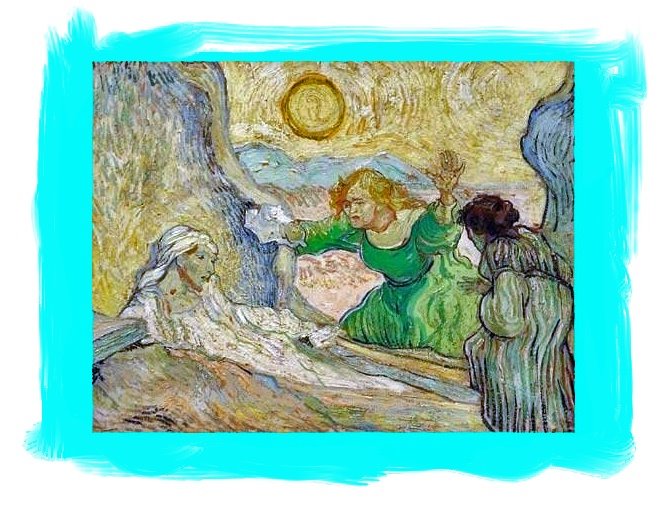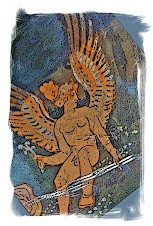Translation: Copyright FairyTaleChannel.org
(Please read, enjoy, link to or pass this story on to friends.
Please do not plagiarize, copy or pilfer. Thanks!)
Many years ago a poor tinsmith, who repaired pots and pans for a living, could no longer feed his family for he could not find work. Wherever he went he only found people living in greatest need and terrible suffering for the plague had infested villages and towns. Often entire families were struck down, including cattle and even the family dog. The survivors ran wildly through the streets as if insane or sat lifeless in front of their houses, stunned and brooding. The poor tinsmith had passed through all the villages on the shadow side of the Rhone River and had sold only a few small scraps. Tired and dejected, he crossed the Rhone River and thought he would now try walking on the sunny side. But the plague had wreaked havoc there also. He climbed up the mountain slag panting and gasping for breath. From time to time he had to wipe the sweat from his brow. His only wish was to lie down and rest, rest for all time. In the village he was now passing through it was deathly still. The house doors were wide open; the evil smell of corpses wafted through the alleyways and made him shudder. No one responded to his knocking. On the threshold of the last house sat a man as old as the stone cliffs, he had a long snarled beard and green, bulging frog eyes. Sadly, the little man gazed up and said in a rattling voice: You don’t need to come here with your tin pots, you won’t sell any here, the plague has been guest in this abode. Yes, I am the sole survivor of the village and I won’t buy anything from you. I have plenty of good and bad utensils – in excess. I have become a rich man, the entire village belongs to me and me alone,” and he laughed wildly and struck his forehead with his palm. Then he glared at the tinsmith with the same sad gaze. “Should I show you the way to where you will find work?” The tinsmith shifted the heavy bundle on his back and said: “Yes, I’d be happy to find some work, but I’m sure there is nothing anywhere and the pots will stay on my back!” The little man made a sign that the man should follow him. He placed a thick hazel branch between the pots and tin pans, shifted the bundle with the stick and plodded behind the little man, who slowly climbed the mountain. Every ten steps the man stopped, coughed but finally led him to an open field, which was easy to climb at the far end. But the front end of the field was a jagged drop-off, filled with fir trees. The sun had just sunk behind the mountain and it would soon be dark. The little man pointed to a narrow path, which led from the base of the cliff, on which they stood, in a straight direction but always upward, over the broad Rhone Valley to the peak of the Eliserhorn, which projected through the dark mass of the cliff with its snow-covered peak. On the peak of the Eliserhorn there burned a light, not larger than a star in heaven. The little man cried: Take this path and always, always follow the light! A deep, dark night will break and evil spirits will seemingly build broad bridges for you; you must not lose sight of the light, otherwise you will sink into endless night. The ocean lies below the bridge. It will remain calm as a green mountain lake, then it will become red and then roaring and finally will become sulfur-yellow and putrid. The raging waves will beat over your path and threaten to devour you.” The tinsmith thanked the old man as the distant, remote light started to awaken new hope within him. He grasped his bundle of pots tightly and with the little light firmly in his gaze, he began his climb up the narrow aerial path. His stride was slow and deliberate, his steps long so that the tin ware on his back rattled with each step. He looked at the green shimmering surface of the water, which extended before him like an endless sea. But soon the sea glimmered a purple-red; the waves began to curl over and became larger and larger. Soon, they began to rock back and forth and he became dizzy. He began to stagger and stumble but found his equilibrium again and again with his hazel stick. When he looked into the water’s depths for only a heartbeat, he thought he would crash into the waves, but he immediately gazed up into the radiating light and stepped weakly in that direction. He paid no attention to the beautiful, wide and brightly illuminated bridge, which enticingly rose from the water and formed a bridge to the narrow and bumpy path he was on. The closer the little light appeared on the peak of the Eliserhorn, the brighter it burned. The path was now enveloped in the depths of darkness and below him the waters raged like an ocean storm. The yellow shimmering waves rolled with unceasing force against the ramp he walked on. Now the water breached the path and threatened to tear him away. The spray, hitting the granite cliff edges, splashed up striking his face and enveloping him in a veil of foam, drenching his clothes. The putrid water took his breath away. But now he was close to the light and with his last strength, he pushed himself through the foaming surf and the waves, which rose up to his left and right were as high as towers. The sea suddenly subsided below him. A great calm descended all around. He was at his destination and stood on a large, level place. Before him stood a mighty church built of snow-white marble. In its beautiful, richly decorated façade he counted twelve doors. The tip of the tower seemed to extend into the heavens and shone like a star, in white blinding light. It all seemed so solemn, so beautiful and holy that he had to fold his hands in prayer. Over the entrance gate could be read: Church of Eternal Joy. On both sides of the gate guards stood in white shirts with golden collars, on which were written S Z (sit Zion). The one held a pick on his shoulder, the other a shovel. The tinsmith wanted to put down his heavy bundle to enter the church properly, as is fitting; but the guards motioned to him he should take everything with him. So he stepped through the gate with the rattling bundle and entered a richly illuminated hall filled with people. It looked like the inside of any church at home, but only here it was much larger, majestic and solemn. The hall at the front and back was crossed by a passage. On the right side of the front passage he noticed a funeral pyre. He set down his tin ware as quietly as possible, kneeled completely exhausted and covered in sweat on a riser and listened to the beautiful heavenly music, which came to him from the choir. The sound was like the rushing of the organ, and other times was like the rushing of a forest stream, which fell from the heights and then rushed peacefully through a green meadow. The souls in the passage were enveloped in white robes, turned their backs to the gate and held both hands before their faces. The souls in the passage before the choir, under which he was also standing, supported their arms on the prayer stool and did not pay any attention to him. The tinsmith hardly dared breathe, he was gripped by such solemn feelings. As far as the eye could reach, everything was rigid, unmoving figures. Only in the choir before him was there bright laughter as if the angels themselves were rejoicing. It must be wonderful there; he had to reach that spot. He stood up, but two white-clad youth approached him, softly taking his arm, they said he must not enter the choir so dirty. He should wait a bit. He sank back onto the prayer bench, but when the youth vanished, he tried going forward again. For something pulled him there with irresistible force. Two med appeared in red robes and said to him “Follow us, you are not yet clean, we will wash you and cleanse you, then when you may join the throng that sing and praise in the choir!” They led him by the arm through the throng, which silently made room for him. Proceeding through the door of a passage, he climbed the steps of a high tower and opened the door to a lovely room. On the table lay a scourge and tightly twisted cords. On the wall stood washing utensils and fastened to the wall sparkling faucets could be seen. The men removed his clothes, filled the barrels with water: first tepid and then boiling water. They scourged him with the whip so that his skin fell off, then they splashed him with ice-cold water and immediately his body was covered with young, fresh skin. The horrible pain turned into a wonderful, heavenly feeling of comfort. After this, they dressed him in a soft muslin shirt and said he could now pass through the door. The led him down the steps and through the passageway to the singing saints, asked him to kneel on a large, cushioned riser and ask the Heavenly Father for a beautiful cap of eternal life. He should imagine something of indescribable beautiful and then wish for it. He knelt in the choir and fervently prayed the Our Father so that he soon forgot to wish. He was hardly done, when the youth were once more at his side and waved to him to follow so that he could make room for another. They stepped out to the temple and arriving before its doors, wandered almost a half hour on a beautiful and wide street. High trees with large leaves marked the path. The trees were of such splendor, he had never laid eyes on such marvels. Between the branches he saw a garden inestimable size, from which the most wonderful sweet smells of flowers emanated. He drank in the fragrance and could not get enough of it. Before him stood vineyards, which hang ripe with fruit. “Eat your fill,” the guide said to him. He picked a grape but each time he raised the fruit to his lips, he felt already satisfied. When he had tried every assortment, one of the youth presented him with the key to his house, which hung on a green band. He would now be the occupant of this house. He could not really say what it looked like, for the splendor glimmered before his eyes and completely enveloped him. He only saw how enormous carnation stalks from the darkest red to the brightest snow-white hung over the wall. When he asked whether he could open all doors with this single key, the youth replied, this one key opened every door. Then he asked whether he could not fetch his family and his relatives and friends, because it was so beautiful here and he felt so happy. The youth replied: “They will come but not all. Do you see over there in front of the large gate to the cathedral? There stands the bishop with his tall miter cap and long staff. He has been standing there for a long time and must wait even longer, for he won’t be let inside!” He nodded his head and thanked them once more. Then the youth vanished.
Monday, January 19, 2009
Subscribe to:
Post Comments (Atom)
.jpg)
.jpg)

No comments:
Post a Comment